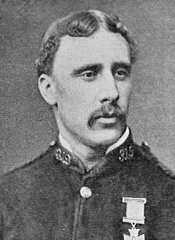Frederick Hitch
| Frederick Hitch | |
|---|---|
 | |
| Born |
27 November 1856 Southgate, London |
| Died |
6 January 1913 (aged 56) Chiswick, London |
| Buried at | St. Nicholas' Churchyard, Old Chiswick (51°29′03.06″N 0°15′10.9″W / 51.4841833°N 0.253028°WCoordinates: 51°29′03.06″N 0°15′10.9″W / 51.4841833°N 0.253028°W) |
| Allegiance |
|
| Service/branch |
|
| Years of service | 7 March 1877 – August 1879 |
| Rank | Private |
| Unit | 24th Regiment of Foot |
| Battles/wars | Anglo-Zulu War - Rorke's Drift |
| Awards | Victoria Cross |
| Other work | London cab driver |
Frederick Hitch, VC (29 November 1856 – 6 January 1913) was an English recipient of the Victoria Cross for his actions at the Battle of Rorke's Drift, the highest and most prestigious award for gallantry in the face of the enemy that can be awarded to British and Commonwealth forces.
Details
Hitch was 22 years old, and a private in the 2nd Battalion, 24th Regiment of Foot (later The South Wales Borderers), British Army during the Anglo-Zulu War when the following deed took place for which he was awarded the VC. The citation was published in the London Gazette on 2 May 1879:[1]
War Office, May 2, 1879.
THE Queen has been graciously pleased to signify Her intention to confer the decoration of the Victoria Cross on the undermentioned Officers and Soldiers of Her Majesty's Army, whose claims have been submitted for Her Majesty's approval, for their gallant conduct in the defence of Rorke's Drift, on the occasion of the attack by the Zulus, as recorded against their names, viz.:—
2nd Battalion 24th Regiment Corporal William Allen and Private Frederick Hitch
It was chiefly due to the courageous conduct of these men that communication with the hospital was kept up at all. Holding together at all costs a most dangerous post, raked in reverse by the enemy's fire from the hill, they were both severely wounded, but their determined conduct enabled the patients to be withdrawn from the hospital, and when incapacitated by their wounds from fighting, they continued, as soon as their wounds had been dressed, to serve out ammunition to their comrades during the night.
They were assisted in passing out ammunition by Padre George Smith.
Further information
Hitch's wounds were so severe that they led to his discharge from service upon the conclusion of the war. He then moved from job to job, unable to perform manual work due to the damage to his arm he had received during the battle. He married in 1883, but reportedly found life difficult living on his disability pension from the government, which amounted to just £10 a year. In 1901, whilst climbing a ladder he suffered a fall. When he awoke in hospital his VC, which he always wore, had been stolen.
Forced to pay for a new one from his own pocket, Hitch also lost his job soon afterwards when he was accused of faking the fall to hide the fact that he had sold his medal to raise funds. This has never been proven. Hitch had eight children, and managed to land a steady job, at first as a horse-drawn carriage taxi driver and later a motor car taxi service. This provided him with a comfortable income for some years. Some unforeseen, and unknown, disaster meant that by the time of his death in 1913 he was living alone in Chiswick, West London at 62 Cranbrook Road where he is commemorated with a blue plaque from English Heritage. He collapsed and died at his home whilst talking to a neighbour. He was buried in St Nicholas' churchyard in Chiswick, with full military honours. His missing VC later reappeared at auction. Hitch's family raised £85 to retrieve it.
Another version is that he was given a position in Whitehall as a ceremonial guard and his VC was cut off his chest and he was knocked to the ground. In this version his VC was replaced by the regiment. Many years later his original was put up for auction and his sons managed to raise enough money to buy it back. Both the original and the replacement are in the regimental museum.
Frederick Hitch was illiterate, and when he joined the army he signed the official enlistment forms with a cross [X].
He is buried in the centre of St. Nicholas' Churchyard, Old Chiswick. Block P, grave 17. The grave is difficult to miss since it is more of a monument than a grave, featuring a helmet on top. His funeral was attended by a large number of London 'cabbies' and still today there is the Fred Hitch Gallantry Award for cab drivers.
The medal
His Victoria Cross is displayed at the South Wales Borderers Museum Brecon, Powys, Wales.
References
- ↑ The London Gazette: no. 24717. pp. 3177–3178. 2 May 1879. Retrieved 28 November 2007.
External links
- Pte. Frederick Hitch (biography, photos, memorial details)
- Location of grave and VC medal (W. London)
- Find-A-Grave (bio and picture)
- Frederick Hitch (detailed biography, history, and Rorke's Drift)